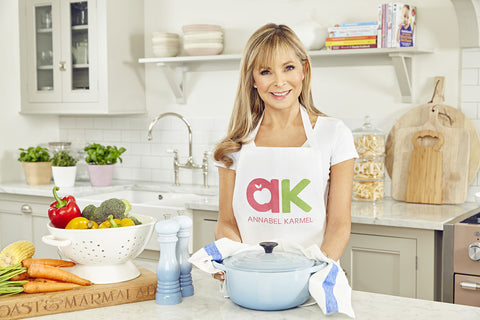Organic and Earth-friendly meals - Baby weaning tips

We are delighted to bring you this blog article about organic and healthy baby meals. In conjunction with our giveaway collaboration with Annabel Karmel this month, our founder Ila Colombo couldn’t wait to speak with her to learn about best cooking habits in times of climate emergency and other recommendations for healthy baby feeding.
Annabel Karmel is the number one baby-weaning-guru in the UK, an incredible mum-of-three, and probably the most successful and knowledgable author of baby cookbooks. Her passion and career has helped families from all over the world feed their babies and children with delicious and nutritious meals since 1991, with her first book published ‘The Complete Baby and Toddler Meal Planner’. She has written more than 40 books in over 25 languages and has her own food ranges and weaning equipment across the UK and abroad.
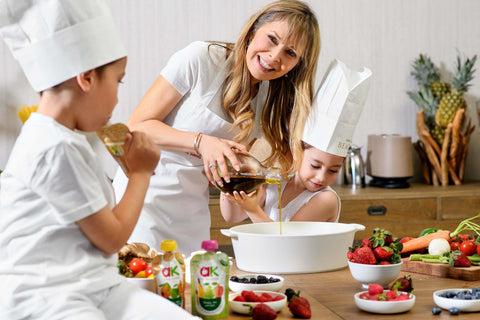
As an impact founder I’m always interested in learning the sustainable side of things and when it comes to the kitchen I often feel uncertain of how good or how positive what I cook for my daughter actually is, I try my best to buy organic and plastic-free but somehow packaging and food waste still manage to pile up in the bin…to get to the heart of the topic, I asked Annabel to tell us what she thinks about sustainable kitchen practices and organic baby food.
Ila: Today the climate emergency is of foremost importance for parents, everyone is concerned with global warming and the younger audience is extremely passionate about conscious consumerism; while a lot of organisations, including the UN, advocate the urgent adoption of more sustainable diets at a global level, I think it’s still quite confusing for mothers to understand how to achieve a good nutritionally-balanced diet which is also environmentally- friendly. What is your view on the subject? Do you think going back to local-market-shopping and buying organic is a good enough answer?
Annabel: I also try to adopt a nutritionally-balanced yet environmentally-friendly diet and encourage little ones to do the same too – after all they are the next generation so it’s important that we teach them young! There are simple, easy changes you can make to what you eat and how you shop to do so. For example, fruit and Veg are loaded with nutrients you can’t get elsewhere – try and buy more at local farmer’s markets and buy fruit and veg that is in season. To reduce waste, buy frozen fruit and veg, that way you’ll always have them to hand and they’re just as nutritious! There’s a misconception that frozen fruit and veggies are less rich with nutrients, but actually produce is frozen within hours of being harvested which locks in nutrients and helps food stay fresher for longer. I always encourage people to get in the habit of freezing their leftover food rather than putting it in the fridge, forgetting about and then having to throw it away – it’s a very simple but effective change you can make to help reduce waste and have food at the ready on a rainy day! Another good way to ensure a nutritionally-balanced diet that is also environmentally friendly is to eat less animal products and more plant-based foods. I have just invested in a vegan business and we are making vegan ‘no chicken’ nuggets and vegan plant-based burgers – they are made from a pea protein base which is not only rich in nutrients but tastes amazing. You don’t have to go the full hog (excuse the pun) and commit to a strict vegan diet but introducing plant-based products into your diet is a good place to start – every little helps!
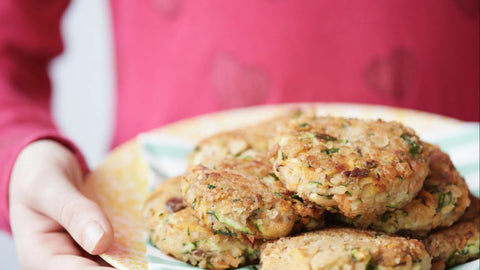
Ila: I’m sure you are experiencing this cultural transition towards sustainable practices too and have seen how it is directly starting to affect the food dietary scene…What have you personally changed in your daily cooking routine to improve your impact on the planet? Do you find it difficult like many of us to be mindful for the planet while at the same time practical and quick in the kitchen?
Annabel: I follow the advice above and make sure to shop locally when I can, freeze my leftovers, and I have also introduced more plant-based options into my diet. On top of that, when it comes to fish, I try to make sure it’s sustainably-sourced as high demand has led to over-fishing of popular species like North Sea cod and Atlantic Salmon. That way I can enjoy a delicious fish dinner, reap in the bountiful benefits of fish, and keep a clear conscience that I’m playing my part to help the species.
Ila: I love how Vegetarianism and Veganism are becoming a mainstream phenomenon, it is now globally recognised that animal products have a much higher negative effect on the ecosystem than plant-based produce…but at the same time I know that for kids, and babies in particular, it’s quite important to eat some meat; What do you think about weaning babies with a vegetarian diet? And, for the more extreme parents when do you think it could be an appropriate age to transition a child to a fully-vegan diet?
Annabel: Its fine to bring your baby or child up as a vegetarian as long as their diet is carefully balanced and does not contain too much fibre. The nutrients that you will need to pay extra attention to are protein, iron, zinc, and the B vitamins, which are usually found in meat-sources. The iron a baby inherits from their mother runs out at 6 months so it’s important to give your baby iron-rich foods from 6 months. Whilst it’s easy to absorb iron from animal foods like beef, chicken and eggs, vegetarian sources of iron are difficult to absorb unless you pair it with vitamin C at the same meal. For example, porridge with berries or chicken with red pepper. I wouldn’t bring a baby under one year up on a strict vegan diet. However, its fine to bring up a baby on a vegetarian diet provided you get the balance right and try to include some high-calorie foods like eggs and cheese. A bulky, high-fibre adult vegetarian diet is too much for young children with little tummies.
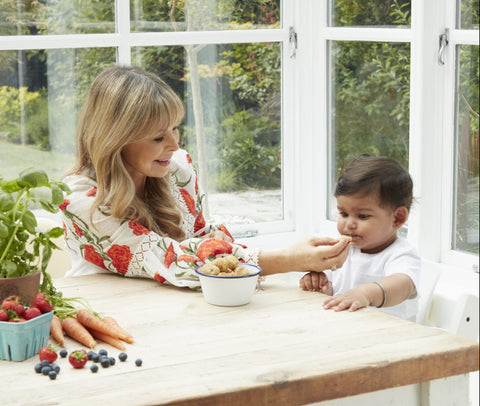
Ila: Food waste is a big concern of mine, I always try to eat everything we cook at home and I’m constantly on the look for creative ideas on how to repurpose food dispose; For example I recently read that the water used and collected from steam-cooking vegetables is rich in minerals and nutrients therefore very good to use to water indoor plants…I’m curious of other ways I can repurpose leftovers or be creative in this kitchen…Do you have any interesting leftover-recipes that could be appealing to a toddler?
Annabel: Absolutely, I always try to factor in how to maximise each meal and make it into yummy, kiddie-approved leftovers to last longer and reduce wastage. My Chicken and Potato Pie recipe is a great example of using leftover chicken, or you can put pretty much anything into wraps – which little ones love. Otherwise, I find soups are a great way of using up veggies that are on its way out. Batch cooking mini meatballs, chicken balls, veggie balls and freezing them is also great to reduce wastage and ensure you always have something yummy and toddler-approved to hand. Also, in most cases frozen vegetables are as good as eating fresh so I often use frozen veg like peas, spinach or frozen berries as a way of ensuring I use what I need and don’t end up throwing anything away!
Ila: When my daughter was around 6 months I was very strict with her feedings and would bring with me organic ready-to-eat pouches or home-made meals everywhere, now that she’s over 1 year and eating solids, we end up going to restaurants quite a lot….I know that too much salt and sugar are both very bad for babies, is there anything else you would advice me to watch out for when eating out with her? What would be your preferred choice from a restaurant menu for a baby or toddler meal?
Annabel: I would first and foremost advise to avoid highly processed foods or ones that are high in fat, salt and sugar, and opt for simple, whole foods where you can. I design a lot of children’s menus in hotels and restaurants in the UK and abroad. For example, I design all the kids’ menus in the stunning and very family friendly Sani resort in Greece, and I make sure to use local produce and ensure that everything is freshly cooked on site. I think it’s a shame that many kids menus only offer stereotypical foods like pizzas, burgers, and nuggets. There are so many other more exciting and exotic foods that kids enjoy like Paella, Satay Chicken, Mild Curries. Also, since you can’t add too much salt to your child’s food, curries and spices like garam masala, cumin and fresh herbs, are a great way of adding taste and introducing little ones to exotic flavours. I think it’s important to introduce lots of different flavours from around the world to children when they are young to prevent them from becoming fussy-eaters. The more you give them a limited range of foods the more fussy they will become! I also think it’s really important to make sure that children eat plenty of fresh fruit and vegetables. On the menu at Sani I make delicious fresh fruit ice lollies and some interesting desserts like a Chocolate Beetroot Brownie, which is a fantastic way of disguising hidden veggies in the most delicious way!
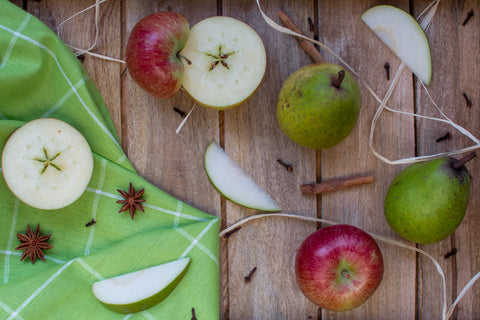
Ila: These days I don’t have much time to fully immerse myself in laborious cooking but on a good Sunday I do love to try new things for my daughter; What are your top three Organic and Earth- friendly baby meals that you would recommend?
Annabel: It’s almost impossible for me to choose just three as I love all of my recipes, but I would recommend downloading my number one rated app Annabel Karmel’s Baby & Toddler Recipe App. There are over 300 quick and easy recipes to choose from for all ages and a host of other features such as meal planners and top tips- you’ll never run out of delicious recipes and fun ideas for how to feed your family!
